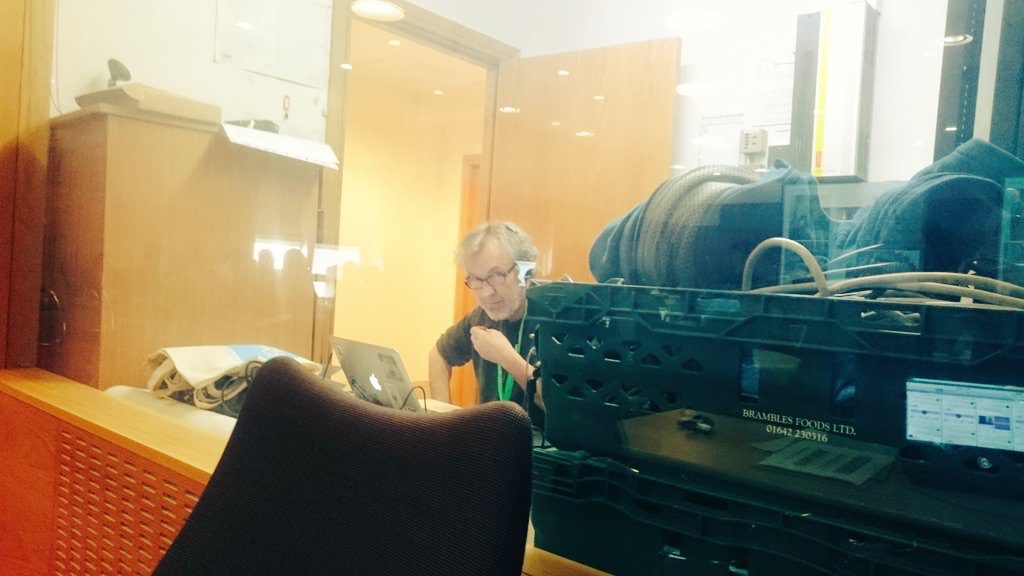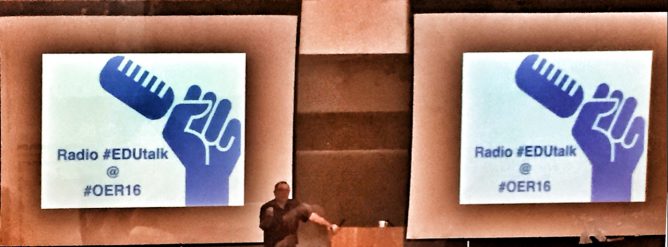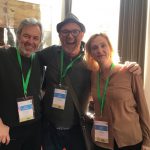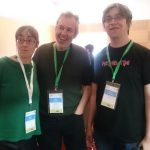Last week I took the edutalk mic to #OER16: Open Culture The 7th Open Educational Resources Conference.
The idea was to broadcast & podcast the keynote and also get some conversations between various participants.
Broadcasting the keynotes worked well. Getting folk lined up for a chat proved more of a challenge. It seems that most of the attendees wanted to be in sessions! I think this was the most engaged conference I’ve ever been at.
Lucky for me folk were happier to give up their lunch than skip a workshop and I managed to record some fascinating conversations.
I’ve cleaned up some of the recordings and posting them to oer16 | EDUtalk.
It is amazing the privilege that having a microphone gives you. You get to listen to a lot of clever stuff.
In higher education the idea of open education is now well enough established that the discussions have become quite nuanced. There are a wide range of definitions and directions on the open road. Some look at practical issues around, licensing and searching of resources others social or technical ideas.
I’ve not seen much evidence that these ideas are penetrating primary or secondary education in Scotland. I do think that open ideas are equally valid here. A good place for school based colleagues to start might be the Scottish Open Education Declaration.

Meetings and greetings
It was a privilege to met and chat to folk who I had met before and those I knew only online. Even though I spent a fair bit of time in the booth I managed to catch up with far to many folk to mention.
OER Messages
I’ve not got a wide ranging knowledge of the OER world, but it was pretty obvious there are different interpretations of open, many speakers alluded to that. The First Keynote Catherine Cronin spoke about the social justice aspects.
Melissa Highton @honeybhighton talked about these different kinds of open, saying it doesn’t matter which one you choose as much as that you know the affordances and limitations of each (my interpretation).
There was a general feeling that the more open a resource the more sustainable it is. The more clauses in a license the more likely it is that it could be unusable if the owner could not be connected.
Personal learning
For the keynotes I had a very good feed from the microphones in the room. There was a little hiss from the rack. Recoding conversations in the booth was a bit more problematic as the rack were giving off a fair rumble. Usually with hiss I’d move out of audacity and go to GarageBand, this time I stayed in Audacity and used the equaliser. For the rumble I did manage to improve the audio a little with a combination of the equaliser and noise reduction effects.
The audio is not great but I’ve been happily listening to the results while commuting. It is surprising what you miss when you are broadcasting a second listen has been valuable to me. I do hope that the content of the presentations and conversations are widely listened to they messages are worth thinking about.. You can find the audio at #OER16 AUDIO
It was delightful to spend time with people who are gathered, not because they want to sell something, but with a shared idea that is aimed at doing good in the world. It was a privilege to do so, I owe thanks to the conference for giving me the opportunity. I am particularly aware that my position over the last few years has allowed me to take holidays to be able to attend events like this during term time, an opportunity not many class teachers have and one I’ll miss next session.
Image credits: Featured image, Jim Groom Keynote where he mentioned Edutalk, my own from the booth at the back.. Me with folk, lifted from twitter.




@johnjohnston thanks john for making #oer16 one of the most accessible @OERConf we’ve ever had.
CC BY-ND Bryan Mathers http://bryanmmathers.com/participatory-culture/
..
I’ve been thinking about OER16 since the conference ended just over four weeks ago. I’m reflecting now not just through the lens of those few weeks but also the other conferences and workshops which I attended immediately afterward, namely the C-DELTA project in Cape Town and the Networked Learning #NLC2016 doctoral consortium and conference in Lancaster. It has felt like a few months’ worth of sharing and discussing research and engaging in wonderful conversations condensed into a few short weeks – a great privilege. So, late is this may be, I want to share a few notes and impressions from these events, beginning with OER16.
As several others have already written, and beautifully (collection of blog posts below), OER16 was enjoyable and tremendously thought provoking. I’ve long considered myself an open educator and I’m currently doing research in the area of open educational practices, so this is a community in which I feel at home. My main takeaway from the conference was that OER16, and the open education community more generally, is growing, changing and evolving. There was a strong strand of critical research shared and enthusiastically discussed both during and after the conference.
My keynote: “If open is the answer what is the question?”
I was honoured to be asked to give one of the conference keynotes by the co-chairs, Lorna Campbell and Melissa Highton. I sometimes struggle with the idea of conference keynotes. I know that plenary speakers can be a powerful (and sometimes provocative) way of exploring conference themes. Yet I find myself wrestling with ways of providing that focus while also including other voices and perspectives, and including space for conversation and discussion. My approach for OER16 was to share my thoughts and questions in a blog post well before the event, inviting ideas, feedback and discussion. That post If ‘open’ is the answer, what is the question? led to several weeks of discussion before the conference; I shared and discussed this in the keynote. During the keynote I focused on 4 key ideas:
Noting the vital connection between networked participatory culture and openness, using as an example Ireland’s 2015 Marriage Equality referendum.
Exploring definitions, interpretations and levels of openness in education, highlighting openness as a complex phenomenon (technical, social, cultural and economic).
Arguing for the importance of a critical and reflexive approach to openness. Openness can help to address issues of access and inequality but it can also bias those already privileged. I highlighted work by Richard Edwards (2015), sava singh (2015), Laura Czerniewicz (2014), Cheryl Hodgkinson-Williams (2014) and others who are doing critical research – including several people who also presented their work at OER16. (Full keynote bibliography included at end of post.)
Sharing work from my own PhD research. In my study of open educational practices in higher education, openness is characterised as individual, complex and contextual. For academic staff openness is: (i) closely linked with identity, (ii) negotiated at multiple levels and continually, and (iii) both a personal and collective decision.
Here is a Storify of tweets from the keynote and my presentation slides:
..
…and many thanks to Beck Pitt for her amazing visual notes!
CC BY Beck Pitt (Flickr)
Presentations, workshops & keynotes
There were many, many dilemmas in choosing sessions to attend at OER16 – the programme was rich and varied. A few highlights for me were:
sava singh discussed her PhD research in a session entitled: Open Wounds: The Myth of Open as a Panacea – this work also is explored in some depth in sava’s recent blog post The Fallacy of Open. sava reminded us of some blunt truths about our own privilege as social media users, e.g. being an early adopter is a privilege; being able to complain about how Twitter “used to be” is a privilege. She highlighted the tension between the discourse of open access and reputational politics in academia. There is a growing ‘be open’ diktat in academia (e.g. for many PhD students) yet for individuals who are marginalised within higher education in various ways, e.g. by race, gender, precarious or otherwise low employment status, etc., sharing work and being open can be risky. sava reminded us to ask ourselves important questions about risk, power, inequality and surveillance when advocating openness.
Viv Rolfe and Dave Kernohan presented Open education: “Runnin’ with the Devil” (their presentation begins at 41 minutes), asking whether the open education community is being critical enough in its evaluation of its progress. Viv discussed her systematic review of studies describing the impact of open education on learning and teaching. Then Dave turned the focus to blogs – “I’ve heard it said that all the good stuff is published in blogs” – talking us through his process of generating semantic blog citation metrics. This is fascinating work which I hope Viv and Dave will continue to develop.
Sheila MacNeill and Keith Smyth shared the results of their ongoing collaboration in two detailed blog posts before the conference: Reframing Open in the context of the digital university – part 1 and part 2. In their work, Sheila and Keith use of the concept of Third Space (neutral, collective, inclusive spaces) to theorise the Digital University. I’m particularly intrigued by the concept of digitally distributed curriculum which is explored in the blog posts, and look forward to watching this work as it develops.
I participated in a lively workshop facilitated by Christian Friedrich and Shaun Hides entitled: Are we openness ready? Towards an Open Learning Scale. The workshop built on work by FemTechNet and Liz Losh, which used rapid feminist prototyping to identify “drivers of openness”. Christian and Shaun began by sharing the thinking behind the six drivers of openness; then we identified three to develop further in a “maker-style” workshop – fun and very thought-provoking.
I felt honoured to attend the session in which Margaret Korosec described the amazing Stolen Lives project. Stolen Lives is a collaborative open educational project with the aim of increasing awareness of modern-day slavery – as Margaret described “using OER to combat modern slavery”. Facts: 35 million people are enslaved worldwide and there are 13,000 people in forced labour in the UK today. During two days in which inequality and social justice were invoked by many, this work is a touchstone for what is possible. This project deserves to be shared widely.
Finally, if you are at all interested in openness, OER and/or OEP, please do check out the summaries (listed below) and videos of the wonderful keynotes by Emma Smith, John Scally, Jim Groom and Melissa Highton:
Emma Smith, a Shakespearean scholar, spoke honestly and humbly about her ‘open’ journey. Beginning with the decision to record audio podcasts of her lectures for the sake of students who might miss a lecture, she moved on to the realisation that releasing her lectures openly had “completely transformed my teaching”. Emma’s CC-licensed podcasts “Approaching Shakespeare” are available on iTunes and on the University of Oxford website.
John Scally, National Librarian at the National Library of Scotland (NLS) spoke about the digital strategy of the library and the challenge of balancing tensions between preservation and access. John believes that the library needs to go further than widening access, however: it needs to promote equity.
After years of quoting Jim Groom in my own presentations, I finally got to hear him in person (and meet his lovely family who had travelled to Scotland with him). As Jim describes in his own blog, he brought us on the magical, mystery tour that is DS106. He lifted the focus from OER and even OEP/open pedagogy to open technical infrastructure. The keynote was an awesome summary of work done by Jim and a great many people whom he mentioned throughout – including DS106 students and participants. As Jim reminded us “most of the work that students have done [in DS106] is still there”.
Finally, conference co-chair Melissa Highton concluded the conference on a high note, speaking in her capacity as Director of Learning, Teaching and Web Services at the University of Edinburgh. In her thoughtful and inspiring keynote, Melissa reminded us what it means to be open in an institutional context, highlighting the university’s OER policy: http://open.ed.ac.uk. She used the concept of ‘copyright debt’, analogous to technical debt, to make a strong case for open. Melissa’s take home message: “Not being open is a risk and not being open costs us money.”
OER16 blog posts
#OER16: Empowered openness by Maren Deepwell
#OER16: Open Culture conference overview by Lorna Campbell
#OER16 – the friendly conference by Frances Bell
Radio EDUtalk at #OER16 by John Johnson
Several posts on OER16 conference blog
Exploring openness at #OER16 by Nicole Ingerson
Open is messy & that’s OK by Simon Thomson
Literally [Ear] Buddies: Virtually Connecting at #OER16 by Alan Levine
Challenging openness & innovation – takeaways from #OER16 & #OLCInnovate by Maha Bali
Virtually Connecting
…and last but not least Radio EduTalk – a wonderful series of radio interviews produced by John Johnson
(apologies to anyone whose posts I may have missed!)
…and finally
Many thanks to Lorna Campbell and Melissa Highton, wonderful co-chairs of the conference and inspiring women in tech. Thanks also to the wonderful ALT team who supported us – before, during and after the event. Special thanks to Martin Hawksey and John Johnson, an incredible team; through their efforts the conference was made open via live audio and video streams, video recordings and audio interviews. And thanks to all who shared their work and participated in the conference; you made the two days very special…
CC BY-SA catherinecronin (Flickr)
..Bibliography (from my keynote)
Beetham, Helen (2015) Revisiting digital capability for 2015. Jisc.
Beetham, Helen, I. Falconer, L. McGill, A. Littlejohn (2012) Open Practices: Briefing Paper. Jisc.
Cottom, Tressie McMillan (2015) Open and Accessible to What and for Whom? Blog.
Czerniewicz, L. (2015) Confronting inequitable power dynamics of global knowledge production and exchange. Water Wheel 14(5), pp. 26-28.
Edwards, Richard (2015) Knowledge infrastructures and the inscrutability of openness in education. Learning, Media and Technology 40(3), pp. 251-264.
Ehlers, U.-D. (2011). Extending the territory: From open educational resources to open educational practices. Journal of Open, Flexible, and Distance Learning, 15(2), pp. 1–10.
Hodgkinson-Williams, C. (2014) Degrees of ease: Adoption of OER, open textbooks and MOOCs in the Global South. OER Asia Symposium.
Jenkins, Henry, et al. (2007). Confronting the Challenges of Participatory Culture: Media Education for the 21st Century. Chicago: MacArthur Foundation.
Jenkins, Henry, Mizuko Ito & danah boyd (2016) Participatory Culture in a Networked Era. Cambridge: Polity Press.
National Forum for Teaching & Learning in Higher Education (2015) Developing a Roadmap for Building Digital Capacity. National Forum Report.
sing, sava saheli (2015) The Fallacy of “Open”. savasavasava blog.
Stewart, Bonnie (2015) Open to influence: What counts as academic influence in scholarly networked Twitter participation. Learning, Media and Technology 40(3), pp. 1-23.
Veletsianos, George & Kimmons, Royce (2012) Networked participatory scholarship: Emergent techno-cultural pressures toward open and digital scholarship in online networks. Computers & Education, 58(2), pp. 766–774.
Share this:Click to share on Twitter (Opens in new window)Share on Facebook (Opens in new window)Click to share on LinkedIn (Opens in new window)Click to share on Google+ (Opens in new window)Click to share on Pinterest (Opens in new window)Click to share on Reddit (Opens in new window)Click to email (Opens in new window)Click to print (Opens in new window)Like this:Like Loading…